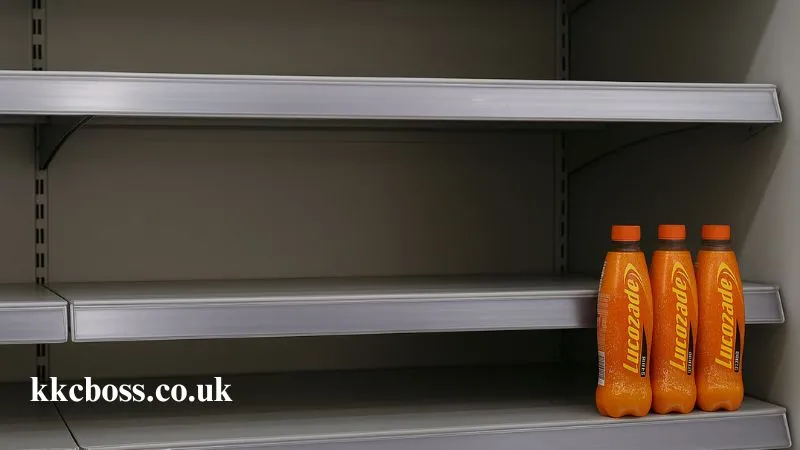Lucozade, the iconic energy and sports drink brand, has long been a staple on supermarket shelves, in gyms, convenience stores, and among athletes and everyday consumers alike. Renowned for its signature flavours and energising properties, Lucozade holds a prominent place in the UK beverage market.
However, throughout late 2024 and into 2025, customers and retailers have faced an unexpected challenge: a widespread shortage of Lucozade products. From industrial disruptions to factory incidents, the brand has been at the centre of a significant supply chain crisis.
The scarcity has sparked frustration among loyal consumers and posed logistical challenges for distributors and retailers. But beyond the empty shelves lies a story of complex operational setbacks, organisational response, and lessons for the broader retail industry. In this article, we’ll take an in-depth look at the reasons behind the Lucozade shortage, how it has affected the market, and the efforts made to restore supply. We’ll also explore critical takeaways for businesses navigating supply chain volatility in today’s world.
Why Is There a Shortage of Lucozade?
The shortage is the result of a perfect storm of internal and external disruptions. A combination of industrial action, mechanical failures at production plants, and supply chain constraints all played a role in slowing down or halting the production and distribution of Lucozade products.
This wasn’t a case of a simple production delay. Instead, multiple layers of disruption—some predictable, others unexpected—created a bottleneck that affected every stage from manufacturing to retail delivery. As demand remained strong, supply was unable to keep pace, quickly leading to visible gaps on store shelves.
Production Setbacks: Industrial Action and Factory Incidents
Industrial Action Impacts Production
Labour tensions have been mounting within several parts of the food and beverage industry, and Lucozade’s manufacturer, Suntory Beverage & Food GB&I (SBF GB&I), was no exception. Workers staged a series of industrial actions in response to stalled negotiations over pay increases and working conditions. These strikes disrupted production schedules, leading to halted lines and reduced output across multiple facilities.
The timing of these actions couldn’t have been worse. Coming at a peak season when demand traditionally spikes—particularly for sports and energy drinks—the disruption had an amplified effect on stock availability across the market.
Factory Incident Causes Significant Halt
As if labour disputes weren’t challenging enough, a critical technical incident at one of Lucozade’s main production facilities added fuel to the fire. A malfunctioning piece of equipment resulted in a prolonged shutdown of a key production line, further delaying the manufacturing of high-volume products such as Lucozade Energy Orange and Lucozade Sport.
Repair timelines were complicated by the need to source specialised parts and the impact of ongoing labour shortages in the engineering and maintenance workforce.
Market Impact: Shortages and Consumer Frustration
Empty Shelves and Frustrated Customers
The result of these combined disruptions was immediately visible to the public. In supermarkets and convenience stores across the UK, regular buyers of Lucozade were met with empty shelves and “out of stock” labels. This created confusion and frustration, especially for those who rely on the product for hydration, sports performance, or daily energy boosts.
Social media buzzed with posts from annoyed customers expressing their disappointment, and some even began hoarding available stock when they found it—further contributing to the scarcity.
Widespread Stock Availability Issues
The shortage was not confined to one geographic area. Retailers across the UK, from large supermarket chains like Tesco and Sainsbury’s to smaller independent shops, all reported difficulties in replenishing Lucozade stock. Online retailers also experienced delays and cancellations, frustrating customers trying to buy in bulk.
Specific Lines Particularly Affected
Not all Lucozade products were equally affected. The most impacted lines were high-demand products such as:
-
Lucozade Sport (all flavours)
-
Lucozade Energy Orange
-
Lucozade Energy Original
-
Multipack formats
These items represent a significant portion of Lucozade’s total volume sales, and their absence caused noticeable sales dips for retailers.
Manufacturer’s Response: Communicating and Correcting
Manufacturer Communicates Challenges
In response to growing concern and speculation, SBF GB&I released official statements acknowledging the supply issues. They outlined the reasons behind the delays and provided reassurance that efforts were underway to restore production. Their communication strategy aimed to maintain trust with both consumers and retailers.
SBF GB&I’s Response and Recovery Efforts
The company launched a multi-faceted recovery strategy which included:
-
Accelerating repairs to production lines
-
Increasing shifts at alternate manufacturing sites
-
Improving workforce conditions to prevent future strikes
-
Temporarily limiting SKU variety to prioritise core products
These measures aimed to stabilise supply while preparing for a full production recovery.
Back on Track: Production Recovery Timeline
Phased Production Restart
By early 2025, SBF GB&I began gradually restarting full-scale operations. Priority was given to the most popular lines and major retail clients to ensure widespread reavailability.
Gradual Return of SKUs
As factory capacity returned, the company reintroduced additional SKUs, flavour variants, and packaging formats on a staggered basis. This ensured that logistics systems weren’t overwhelmed and that stock could be distributed fairly.
Lucozade in 2025: Supply Normalised
As of spring 2025, Lucozade’s supply levels have returned to near-normal, with most SKUs available in both retail stores and online platforms. Minor inconsistencies may persist in isolated areas, but the overall market has stabilised.
Significant Improvement Reported
According to market data, availability is now above 90% of pre-crisis levels. Retailers are restocking regularly, and consumer confidence in the brand has started to recover.
Looking Forward: Focus on Innovation and Growth
Focus Shifts to Growth and Innovation
With supply restored, SBF GB&I has resumed focus on long-term growth. This includes launching new product variants, investing in sustainable packaging, and re-engaging consumers through refreshed marketing campaigns and sports sponsorships.
Lessons for Retailers: Navigating Supply Chain Crises
The Importance of Supply Chain Visibility
The Lucozade shortage underscored the need for real-time visibility into supplier operations. Retailers with better upstream data access were able to react faster and allocate shelf space more effectively.
Diversification Is No Longer Optional
Depending heavily on one supplier or product line is a risk. Retailers must explore alternative suppliers and build a more varied product mix to cushion against future disruptions.
Strengthening Relationships with Suppliers
Good communication between retailers and manufacturers is crucial in crisis moments. Retailers who maintained open dialogue with SBF GB&I were better prepared to manage stock flow and customer expectations.
Customer Communication Matters
Retailers who actively communicated with customers—through store signage, websites, and social media—were more successful in maintaining customer trust during the shortage.
Time to Rethink Just-in-Time
The widely used just-in-time inventory model proved vulnerable during this disruption. Retailers are now re-evaluating whether holding additional safety stock may be worth the extra cost in exchange for reliability.
Resilience Is a Competitive Advantage
Ultimately, those who could adapt quickly to disruption not only survived the crisis—they gained market share and customer loyalty. Resilience in supply and operations is no longer optional; it’s a strategic priority.
Conclusion
The Lucozade shortage serves as a timely reminder of how fragile even well-established supply chains can be. From strikes to factory breakdowns, every link in the chain matters. As Lucozade recovers and prepares for a new chapter of innovation and growth, retailers and suppliers alike must reflect on the lessons of this disruption.
In today’s interconnected world, resilience, agility, and transparency are no longer just operational buzzwords—they are essential business strategies for survival and success.

